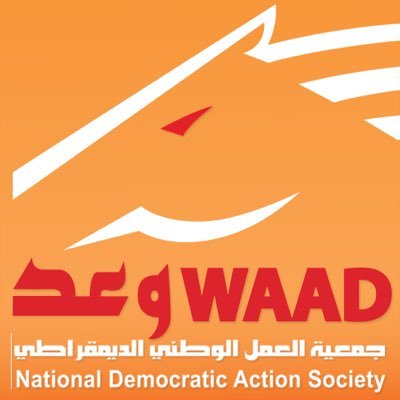On 17 April 2017, a Bahraini court held its second hearing to dissolve the National Democratic Action Society, the country’s largest secular, leftist opposition society. The government accused the society, also known as Wa’ad, of undermining state security and supporting terrorism. The justice ministry’s case against Wa’ad is representative of the government’s ongoing suppression of Bahraini political and civil society space. If the government dissolves Wa’ad, it will be the third political society forced to disband since the 2011 pro-democracy protests.
This is not the first time that Bahraini authorities have targeted Wa’ad. Authorities arrested its leader, Ibrahim Sharif, following the Arab Spring protests in Manama. He served a four year sentence, but upon his release, officials rearrested and sentenced him to one year in prison. The government charged him with “incitement to overthrow the regime” after he gave a speech calling on the government to make commitments to political reform. Wa’ad’s headquarters have been vandalized in the past, as well as burned down twice. In 2014, the government initiated legal action to suspend Wa’ad before parliamentary elections, but dropped the case four months later. More recently in November 2016, authorities ultimately dropped additional charges against Sharif related to an interview he gave with the Associated Press after interrogating him and Wa’ad then-Secretary-General Radhi al-Mousawi that same month. Officials then banned al-Mousawi from travel.
The government has broadly restricted free expression and political participation by targeting political societies and imprisoning political leaders. In 2012, the Bahrain government dissolved Amal, the Islamic Action Society, a major Shia Islamist party, and arrested many of its members and leaders. In September 2016, the Bahraini High Civil Court of Appeals upheld a verdict to disband Al-Wefaq National Islamic Society, the largest political opposition group in Bahrain. Al-Wefaq’s Secretary-General Sheikh Ali Salman has been repeatedly subjected to judicial harassment and is now set to serve four years in prison related to politically-motivated charges related to free expression. Then in October 2016, a Bahraini court sentenced Fadhel Abbas, the former Secretary-General of al-Wahdawi political society, or the Unitary National Democratic Assemblage, to three years in prison.
Actors within the international community have expressed concern about the Bahraini government’s growing repression and the shrinking of political space. UN High Commissioner for Human Rights Zeid Ra’ad al-Hussein highlighted the Bahraini government’s restrictions on civil society in his report to the 34th Human Rights Council in March 2017. In his report, he warned that human rights violations would exacerbate people’s grievances. Representatives from Switzerland also raised the issue of Bahraini officials’ detention of civil society actors and political opposition. However, these recent statements on the international stage have not deterred the Bahraini government from acting with impunity regarding its persecution of Wa’ad.
The final hearing on the future of Wa’ad will take place on April 30 and a verdict is announced in May. As a state party to the International Covenant on Civil and Political Rights, Bahrain has an obligation to uphold its citizens’ rights to free association and political participation. The international community should escalate pressure on the Bahraini government to immediately drop its case against Wa’ad and end restrictions on basic civil liberties.
Rachael Diniega is an Advocacy Intern at ADHRB.





